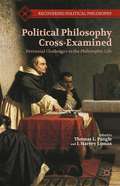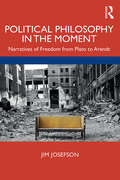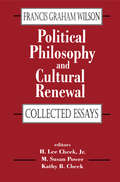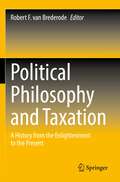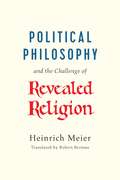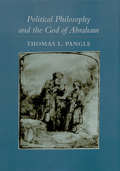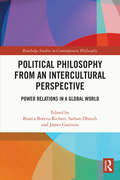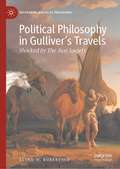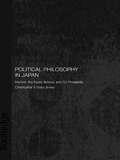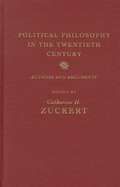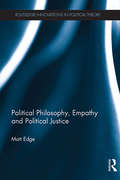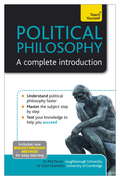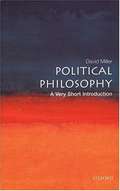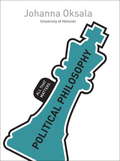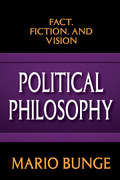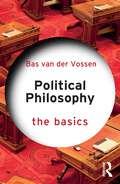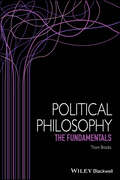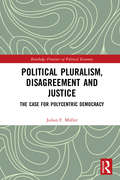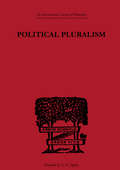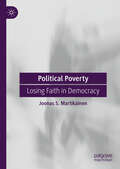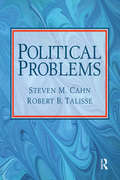- Table View
- List View
Political Philosophy Cross-examined
by Thomas L. Pangle J. Harvey LomaxPolitical societies frequently regard philosophers as potential threats to morality and religion, and those who speak for politics often demand a defense of philosophy. This book will address philosophy as a mode of existence put into question.
Political Philosophy In the Moment: Narratives of Freedom from Plato to Arendt
by Jim JosefsonPolitical Philosophy In the Moment uncovers the political power of narrative by both telling and explaining the stories that frame our ability to be "in the moment." In a series of eleven short stories, Jim Josefson presents the history of political philosophy and Hannah Arendt’s alternative, an aesthetic form of politics. In the early stories, Josefson recounts how the four main traditions of political philosophy (Platonism, Aristotelianism, liberalism and historicism) promise truth but deny us the freedom available in reality. Then, he reviews the alternative narratives offered by thinkers like Kierkegaard, Nietzsche and Heidegger, which influenced Arendt’s view. The final chapters chart Arendt’s route back to the Moment, the freedom to read and tell a fuller story about the beauty and horrors that appear in the world. A page-turning book of short stories and a tour through the greatest works of political philosophy, Political Philosophy In the Moment is as approachable, comprehensible and welcoming as a fairy-tale, ideally suited for students of contemporary political theory and anyone interested in political thought.
Political Philosophy and Cultural Renewal: Collected Essays of Francis Graham Wilson (Library Of Conservative Thought Ser.)
by Francis WilsonFrancis Graham Wilson was a central figure in the revival of interest in political philosophy and American political thought in the mid-twentieth century. While he is best known as a Catholic writer and conservative theorist, his most significant contribution is his original interpretation of the development of American politics. Central to his thought was a process of self-interpretation by the citizenry, a quest for ultimate meaning turning to a divine, transcendent, basis of history and shared experience. Although Wilson's writings were extensive and influential, they have not been readily available for decades.
Political Philosophy and Taxation: A History from the Enlightenment to the Present
by Robert F. van BrederodeThis book explores how taxation is related to the role of the state and its relationship with its constituents, the concept of private property rights, the concepts of societal fairness and justice, and the battle between the individual and the collective. This book appeals to students and scholars who want to know how philosophers in the past and present think about taxation, and how their thinking has developed through cross-influencing. There exists no comprehensive study providing such an overview. This book is a foundational study on the philosophical justification of taxation (qualitative aspect) and the normative qualifications required of tax law to constitute tax that is just and fair (distributive or quantitative aspect). The latter includes evaluation of what type of tax is morally correct or acceptable to realize distributive justice. This book covers periods from the Enlightenment era until the present. The philosophers are grouped together in schools of thought and each chapter except for chapter 1 and chapter 13, are is dedicated to a specific philosophical school. Moreover, this book aims to provide an overview of each school of thinking and the individual philosophers, including placing them in the context of their times. The book has particular importance as the study of taxation is an underdeveloped area of political and legal philosophy.
Political Philosophy and the Challenge of Revealed Religion
by Heinrich Meier Robert BermanHeinrich Meier’s guiding insight in Political Philosophy and the Challenge of Revealed Religion is that philosophy must prove its right and its necessity in the face of the claim to truth and demand obedience of its most powerful opponent, revealed religion. Philosophy must rationally justify and politically defend its free and unreserved questioning, and, in doing so, turns decisively to political philosophy. In the first of three chapters, Meier determines four intertwined moments constituting the concept of political philosophy as an articulated and internally dynamic whole. The following two chapters develop the concept through the interpretation of two masterpieces of political philosophy that have occupied Meier’s attention for more than thirty years: Leo Strauss’s Thoughts on Machiavelli and Jean-Jacques Rousseau’s Social Contract. Meier provides a detailed investigation of Thoughts on Machiavelli, with an appendix containing Strauss’s original manuscript headings for each of his paragraphs. Linking the problem of Socrates (the origin of political philosophy) with the problem of Machiavelli (the beginning of modern political philosophy), while placing between them the political and theological claims opposed to philosophy, Strauss’s most complex and controversial book proves to be, as Meier shows, the most astonishing treatise on the challenge of revealed religion. The final chapter, which offers a new interpretation of the Social Contract, demonstrates that Rousseau’s most famous work can be adequately understood only as a coherent political-philosophic response to theocracy in all its forms.
Political Philosophy and the God of Abraham
by Thomas L. PangleIn this book noted scholar Thomas L. Pangle brings back a lost and crucial dimension of political theory: the mutually illuminating encounter between skeptically rationalist political philosophy and faith-based political theology guided ultimately by the authority of the Bible. Focusing on the chapters of Genesis in which the foundation of the Bible is laid, Pangle provides an interpretive reading illuminated by the questions and concerns of the Socratic tradition and its medieval heirs in the Christian, Jewish, and Islamic worlds. He brings into contrast the rival interpretive framework set by the biblical criticism of the modern rationalists Hobbes and Spinoza, along with their heirs from Locke to Hegel. The full meaning of these diverse philosophic responses to the Bible is clarified through a dialogue with hermeneutic discussions by leading political theologians in the Judaic, Muslim, and Christian traditions, from Josephus and Augustine to our day. Profound and subtle in its argument, this book will be of interest not only to students and scholars of politics, philosophy, and religion but also to thoughtful readers in every walk of life who seek to deepen their understanding of the perplexing relationship between religious faith and philosophic reason.
Political Philosophy from an Intercultural Perspective: Power Relations in a Global World (Routledge Studies in Contemporary Philosophy)
by Sarhan Dhouib James Garrison Bianca Boteva-RichterThe objective of the following collected volume is to encourage a critical reflection on the relationship between "power" and "non-power" in our contemporary "world" and, proceeding from various philosophical traditions, to investigate the multifaceted aspects of this relationship. The authors’ respective investigations proceed from an intercultural perspective and fall predominantly in the domain of political theory and philosophy. This volume takes an intercultural political perspective, which means, on the one hand, involving non-European philosophies in a global debate about power relations and their effects in the world and, on the other hand, confronting local traditions of thought with a global inquiry in order to enter into a philosophical-political dialogue with these traditions. An intercultural approach of this type to political philosophy seeks not only to join others in reflecting upon global problems, but also to decenter of our understanding of the world, drawing attention to new ways of thinking. Insofar as the authors of the planned volume deal with "concrete" philosophical-political problems unfolding in various regions of the world, they seek to shed light on burning issues like migration, human rights violations, dictatorship and language, global poverty, power asymmetries, experiences of injustice with the further goal of offering a particularly intercultural analysis of these problems along with approaches to resolving them. To date, there is no book that collects various essays from different countries and perspectives and poses political-philosophical problems from an intercultural point of view.
Political Philosophy in Gulliver’s Travels: Shocked by The Just Society (Recovering Political Philosophy)
by Lloyd W. RobertsonThis book analyzes Jonathan Swift’s Gulliver’s Travels from a political philosophy perspective. When authors have focused on politics in Swift’s writings, this has usually meant a study of how Swift located himself on issues of his day such as church and state, and Ireland. Robertson claims by contrast that Gulliver’s Travels is fundamentally a book about the “ancients” (e.g. Plato, Aristotle), and the “moderns” (science and technology), and their contrasting views about the human condition. The claim that the Travels is “a kind of prolegomena” to political philosophy leaves open the possibility that it does not achieve, or seek to achieve, a fusion of various teachings but rather uses the device of alien societies to point us to uncomfortable aspects of political philosophy’s “larger questions” we are prone to ignore. Swift, Robertson argues, draws our attention to some version of the classical republic, as idealized in Aristotle’s political writings and in Plato’s Republic, as opposed to a modern regime which, at its best or most intellectual, emphasizes modern science and technology in combination as a way to improve the human condition.
Political Philosophy in Japan: Nishida, the Kyoto School and co-prosperity (Routledge/Leiden Series in Modern East Asian Politics, History and Media)
by Christopher Goto-JonesPolitical Philosophy in Japan focuses on the politics of Japan's pre-eminent philosophical school - the Kyoto School - and particularly that of its founder, Nishida Kitarô (1870-1945). Existing literature on Nishida is dismissive of there being serious political content in his work, and of the political stance of the wider school. Goto-Jones contends that, far from being apolitical, Nishida's philosophy was explicitly and intentionally political, and that a proper political reading of Nishida sheds new light on the controversies surrounding the alleged complicity of the Kyoto School in Japanese ultra-nationalism. This book offers a unique and potentially controversial view of the subject of Nishida and the Kyoto School.
Political Philosophy in the Twentieth Century
by Catherine ZuckertThis book demonstrates the rich diversity and depth of political philosophy in the twentieth century. Catherine H. Zuckert has compiled a collection of essays recounting the lives of political theorists, connecting each biography with the theorist's life work and explaining the significance of the contribution to modern political thought. The essays are organized to highlight the major political alternatives and approaches. Beginning with essays on John Dewey, Carl Schmitt and Antonio Gramsci, representing the three main political alternatives - liberal, fascist and communist - at mid-century, the book proceeds to consider the lives and works of émigrés such as Hannah Arendt, Eric Voegelin, and Leo Strauss, who brought a continental perspective to the United States after World War II. The second half of the collection contains essays on recent defenders of liberalism, such as Friedrich Hayek, Isaiah Berlin and John Rawls and liberalism's many critics, including Michel Foucault, Jürgen Habermas and Alasdair MacIntyre.
Political Philosophy versus History?
by Jonathan Floyd Marc StearsIs the way in which political philosophy is conducted today too ahistorical? Does such ahistoricism render political philosophy too abstract? Is political philosophy thus incapable of dealing with the realities of political life? This volume brings together some of the world's leading political philosophers to address these crucial questions. The contributors focus especially on political philosophy's pretensions to universality and on its strained relationship with the world of real politics. Some chapters argue that political philosophers should not be cowed by the accusations levied against them from outside of their own field. Others insist that these accusations require a dramatic reshaping of normative political thought. The volume will spark controversy across political philosophy and beyond.
Political Philosophy, Empathy and Political Justice (Routledge Innovations in Political Theory)
by Matt EdgeIn this work, Matt Edge offers an innovative approach to political philosophy. He invites the reader to consider the question of political justice from an empathic perspective - if you were asked to construct a theory of justice acceptable to members of a community you were not yourself a part of, how would you succeed in making your proposal acceptable? What tools would you rely on to construct such a theory, and why? Equally, what would make anyone qualified to write such a theory? Using empathy, this remarkable, natural, tool human beings possess for making moral and ethical decisions, and, thereby, placing yourself as someone on the receiving end of the very theory of justice you yourself are constructing, what would you come up with? What set of alterable human structures and systems would you deem acceptable, were you to find yourself in the position of a citizen living under such structures? Political Philosophy, Empathy and Political Justice offers a unique and compelling account of the type of free system required to pass an empathic examination at the heart of these, and related, questions, matters which define all human eras, in the constant search for political and social justice on our diverse planet.
Political Philosophy: A Complete Introduction: Teach Yourself
by Phil Parvin Clare ChambersWritten by Phil Parvin and Clare Chambers, who are current political philosophy lecturers and leading researchers, Political Philosophy - The Essentials is designed to give you everything you need to succeed, all in one place. It covers the key areas that students are expected to be confident in, outlining the basics in clear jargon-free English, and then providing added-value features like summaries of key thinkers, and even lists of questions you might be asked in your seminar or exam. The book's structure follows that of most university courses on political philosophy, by looking at the essential concepts within political philosophy (freedom, equality, power, democracy, rights, the state, political obligation), and then looking at the ways in which piolitical philosophers have used these fundamental concepts in order to tackle a range of normative political questions such as whether the state has a responsibility to alleviate inequalities, and what interest liberal and demovratic states should take in the cultural or religious beliefs of citizens. Teach Yourself titles employ the 'Breakthrough method', which is designed specifically to overcome problems that students face. - Problem: 'I find it difficult to remember what I've read.'; Solution: this book includes end-of-chapter questions and summaries, - Problem: 'Most books mention important other sources, but I can never find them in time.'; Solution: this book includes key texts and case studies are summarised, complete with fully referenced quotes ready to use in your essay or exam. - Problem: 'Lots of introductory books turn out to cover totally different topics than my course.'; Solution: this book is written by a current university lecturer who understands what students are expected to know.
Political Philosophy: A Very Short Introduction
by David MillerThis book introduces readers to the key concepts of political philosophy: authority, democracy, freedom and its limits, justice, feminism, multiculturalism, and nationality. Accessibly written and assuming no previous knowledge of the subject, it encourages the reader to think clearly and critically about the leading political questions of our time. Miller first investigates how political philosophy tackles basic ethical questions such as 'how should we live together in society?' He furthermore looks at political authority, discusses the reasons society needs politics in the first place, explores the limitations of politics, and asks if there are areas of life that shouldn't be governed by politics. Moreover, he explores the connections between political authority and justice, a constant theme in political philosophy, and the ways in which social justice can be used to regulate rather than destroy a market economy. In his travels through this realm, Miller covers why nations are the natural units of government and wonders if the rise of multiculturalism and transnational co-operation will change all this, and asks in the end if we will ever see the formation of a world government.
Political Philosophy: All That Matters
by Johanna OksalaWhat is political philosophy? A philosophical study of political ideas such as authority, freedom, justice and democracy? An inquiry into the best form of government? An attempt to rationally justify forms of authority? Johanna Oksana asks exactly these questions as she opens this brilliant new guide to political philosophy. Rather than attempting to provide the reader with a definite answer, the book invites readers to recognize many of the issues encountered in everyday life as political, the outcome of human practices that incorporate power relations, social norms and obligations. It suggests that political philosophy should be understood as an open-ended, critical project that to some extent concerns everyone. The book employs an original structure which will be a huge help to both students and general readers seeking to understand the topic. Each chapter, which moves chronologically from antiquity to the twentieth century, focuses on selected classic texts in political philosophy, which are briefly introduced and analysed. The texts then function as a springboard for a discussion of central contemporary issues in political philosophy.
Political Philosophy: All That Matters (All That Matters)
by Johanna OksalaWhat is political philosophy? A philosophical study of political ideas such as authority, freedom, justice and democracy? An inquiry into the best form of government? An attempt to rationally justify forms of authority? Johanna Oksana asks exactly these questions as she opens this brilliant new guide to political philosophy. Rather than attempting to provide the reader with a definite answer, the book invites readers to recognize many of the issues encountered in everyday life as political, the outcome of human practices that incorporate power relations, social norms and obligations. It suggests that political philosophy should be understood as an open-ended, critical project that to some extent concerns everyone. The book employs an original structure which will be a huge help to both students and general readers seeking to understand the topic. Each chapter, which moves chronologically from antiquity to the twentieth century, focuses on selected classic texts in political philosophy, which are briefly introduced and analysed. The texts then function as a springboard for a discussion of central contemporary issues in political philosophy.
Political Philosophy: Fact, Fiction, and Vision
by Mario BungePolitical philosophy is not a well-defined field. It hovers between political theory and classical philosophy. Few early political thinkers could have anticipated the most pressing political issues of our time: the need to stop global warming; the reduction of nuclear armaments; the rise of inequality between individuals and nations; and the struggle against authoritarianism, particularly when it comes disguised as democracy or as socialism. Here, celebrated philosopher Mario Bunge masterfully integrates socio-political theory into a philosophical exploration of power and resource distribution in the world today.Bunge contends that even recent political thinkers have generally failed to address the political underpinnings of topical issues. Environmental degradation, gender and race discriminations, participative democracy, nationalism, imperialism, the North-South divide, resource wars, and the industrial-military complex have all largely been bypassed in political thinking. Even connections between poverty and environmental degradation, and between inequality and bad health, have escaped the attention of those who would call themselves political thinkers.Bunge believes that political philosophers should pay more attention to social indicators, such as the standard index of income inequality and the United Nations human development index. It is pointless to write about redistributive policies unless we have a shared understanding of current wealth distribution. This is, in short, a modern treatise on sociopolitical concerns.
Political Philosophy: Teach Yourself
by Phil Parvin Clare ChambersWritten by Phil Parvin and Clare Chambers, who are current political philosophy lecturers and leading researchers, Political Philosophy - The Essentials is designed to give you everything you need to succeed, all in one place. It covers the key areas that students are expected to be confident in, outlining the basics in clear jargon-free English, and then providing added-value features like summaries of key thinkers, and even lists of questions you might be asked in your seminar or exam. The book's structure follows that of most university courses on political philosophy, by looking at the essential concepts within political philosophy (freedom, equality, power, democracy, rights, the state, political obligation), and then looking at the ways in which piolitical philosophers have used these fundamental concepts in order to tackle a range of normative political questions such as whether the state has a responsibility to alleviate inequalities, and what interest liberal and demovratic states should take in the cultural or religious beliefs of citizens. Teach Yourself titles employ the 'Breakthrough method', which is designed specifically to overcome problems that students face. - Problem: 'I find it difficult to remember what I've read.'; Solution: this book includes end-of-chapter questions and summaries, - Problem: 'Most books mention important other sources, but I can never find them in time.'; Solution: this book includes key texts and case studies are summarised, complete with fully referenced quotes ready to use in your essay or exam. - Problem: 'Lots of introductory books turn out to cover totally different topics than my course.'; Solution: this book is written by a current university lecturer who understands what students are expected to know.
Political Philosophy: The Basics (The Basics)
by Bas van der VossenThis book offers an introduction to political philosophy, the study of the role of government in our lives. It discusses what political philosophy is about, its most important and enduring questions, and how to do political philosophy well. Throughout, the book discusses issues such as:• Do we have a moral obligation to obey the law?• What’s the value of equality?• What’s the nature of justice?• How can we answer philosophical questions about politics?• Is political philosophy a form of activism? Or is it more like a science?Written in an inviting and accessible style, Political Philosophy: The Basics offers an ideal starting point for anyone wishing to learn more about the philosophical study of politics.
Political Philosophy: The Fundamentals (Fundamentals of Philosophy)
by Thom BrooksA wide-ranging and up-to-date survey of the leading ideas and debates in political philosophy Political Philosophy: The Fundamentals introduces core topics within the field by engaging students in seminal works in both contemporary philosophy and the history of political thought. Requiring no previous background in the subject, this clear and comprehensible textbook equips readers with the necessary context for understanding different philosophical perspectives. Through eight succinct chapters, Thom Brooks highlights important contributions made from political philosophers from the past and present to connect the history of political thought with ongoing debates. Readers gain insights into various conceptions about the nature of freedom, different ways of understanding equality, longstanding debates over punishment, questions concerning the value of human rights, issues of global justice and severe poverty, approaches to handling climate change and much more. Helping readers develop informed opinions on central issues, Political Philosophy: The Fundamentals: Discusses divergent views about the different forms and limits of freedom that philosophers have defended over time Provides a historical perspective of contemporary understandings of human rights and their origins in natural law and natural rights Illustrates the multiple ways that freedom has been understood, including commonalities and differences Examines various ways of implementing equality and assessing their merits Covers influential work by John Rawls that envisions a well-ordered society governed by principles of justice Featuring carefully selected further readings in each chapter, Political Philosophy: The Fundamentals is essential reading for undergraduate students and general readers interested in the historical development and present-day debates over political ideas and institutions.
Political Pluralism, Disagreement and Justice: The Case for Polycentric Democracy (Routledge Frontiers of Political Economy)
by Julian F. MüllerThis book poses the question: How can we organize society in such a way that our disagreement about facts and norms works to the benefit of everyone? In response, it makes the argument for polycentric democracy, a political arrangement consisting of various political units that enjoy different degrees of independence. <P><P>It is argued that to progress towards justice, we first need to change our attitude towards reasonable disagreement. Theorists have always viewed reasonable disagreement as nuisance, if not as a threat. However, this work puts forward that the diversity of perspectives which underlie reasonable disagreement should be viewed as a resource to be harvested rather than a threat to be tamed. Resting on two key arguments, the author proposes the idea of polycentric democracy as the most capable method of making pluralism productive. The book explores what such a political order might look like and concludes that only an institutional system which is capable of profiting from diversity, such as polycentric democracy, might reasonably be expected to generate an overlapping consensus. <P><P>Continuing in the tradition of Karl Popper and Friedrich August von Hayek, this book lies at the intersection of philosophy, political economy and political theory. It will be of great interest to academics and scholars working in philosophy, politics and economics.
Political Pluralism: A Study in Contemporary Political Theory (International Library of Philosophy)
by Kung Chuan HsiaoFirst published in 2000. Routledge is an imprint of Taylor & Francis, an informa company.
Political Political Theory: Essays on Institutions
by Jeremy WaldronPolitical institutions are the main subject of political theory-or they ought to be. Making the case with his trademark forcefulness and intellectual aplomb, Jeremy Waldron argues in favor of reorienting the theory of politics toward the institutions and institutional principles of modern democracy and the mechanisms through which democratic ideals are achieved.<P><P> Too many political theorists are preoccupied with analyzing the nature and importance of justice, liberty, and equality, at the cost of ignoring the governmental institutions needed to achieve them. By contrast, political scientists have kept institutions in view, but they deploy a meager set of value-conceptions in evaluating them. Reflecting on an array of issues about constitutional structure, Waldron considers the uses and abuses of diverse institutions and traditions, from separation of powers and bicameralism to judicial review of legislation, the principle of loyal opposition, the nature of representation, political accountability, and the rule of law. He refines his well-known argument about the undemocratic character of judicial review, providing a capacious perspective on the proper role of courts in a constitutional democracy, and he offers an illuminating critique of the contrasting political philosophies of Hannah Arendt and Isaiah Berlin.<P> Even if political theorists remain fixated on expounding the philosophical foundations of democracy, they need to complement their work with a firmer grasp of the structures through which democracy is realized. This is what political political theory means: theory addressing itself to the way political institutions frame political disagreements and orchestrate resolutions to our disputes over social ideals.
Political Poverty: Losing Faith in Democracy
by Joonas S. MartikainenFusing critical social theory to critical and political phenomenology, Political Poverty presents a substantial contribution to current discussions on democratic inequality, political agency, political exclusion, and the role of experience in critical theorizing. Political Poverty puts forward an experiential account of political agency that can untangle theoretical knots of the discussion on the inequality of political participation. It also delivers a set of thinking tools that enable political theorists to better understand the motivational aspect of political agency, as well as suggestions on how even seemingly hopeless situations can be addressed by determined bottom-up efforts. Readers will come away from the book with a new perspective on political agency and the problems of encouraging democratic participation.
Political Problems
by Steven M. CahnThis anthology is intended to be used in Political Philosophy courses. It focuses on contemporary political problems, and it is intended to be paired with any of the numerous readers which are dedicated to the history of political philosophy. History, theory, and political problems are the three pillars of the political philosophy course. However, while the anthologies on the history of political philosophy are numerous, there are relatively few sources (and even fewer single sources) that focus on contemporary political problems. This book fills that gap, with the leading contemporary positions on school vouchers, government support for the arts, pornography, same sex marriage, drug legalization, gun control, terrorism, torture, capital punishment, affirmative action, Immigration, and the environment.
